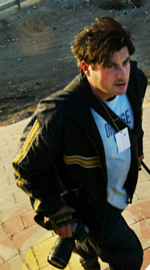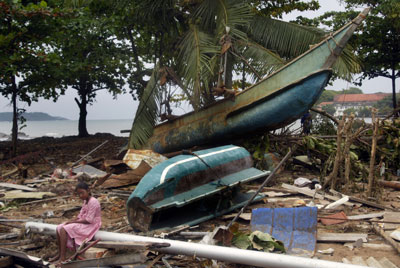 |
 | ||||
Colombo, Sri Lanka
It Just Feels Different January 2005
|
 |
|||
|
By any standard, I am a rookie photographer. Despite having spent ten-years as a writer on a broad range of assignments, I only began as a photographer during the year or so I've spent in Iraq since April 2003. So each assignment and situation poses new challenges and opportunities to learn and my time covering the Tsunami that devastated Sri Lanka's south and east coast was no exception. Having developed my photography skills in Iraq and its near-daily trips to suicide bombings, firefights, hospitals, morgues, and funerals, I felt prepared for the human misery I knew I would witness. My main concern was finding a way to capture for the rest of the world what had happened to the people of this tropical paradise, while keeping editors happy. Shortly after arriving, I planned to scour the southwestern coast as far as I could before returning to Colombo to file from my hotel. Although the roads were badly damaged and progress was slow, each kilometer presented an increasing level of devastation. Pictures were fairly easy to come by, but even my widest lens couldn't show the scope of the destruction. In many ways the bright colors, wonderful light and gentle people of Sri Lanka were a relief compared to bleached-out harsh light of Iraq's monochrome landscape and hostile population. But while I found the Sri Lankan people more cooperative, the slower pace compared to Iraq and its dangers, which make lingering in one place ill advised for westerners, offered new emotional situations for me as a journalist. With time to make careful compositions I was able to build more of a relationship with the subjects, but in doing so I absorbed more of their pain and anguish, without the adrenaline-rush of hard news that has insulated me- at least in the short-term -from the horrors I have witnessed. In one of the hardest hit cities in Sri Lanka, the southern port of Galle, I wandered off the main road into a series of houses not far from a canal that had been completely destroyed. The light was luminous and the collection of destroyed homes seemed like a perfect chance to make some good frames as families searched for dead and tried to scavenge some of their possessions.
Normally I can count on a translator to run some interference for me, but I was alone. His questions were perfectly legitimate and my answers were sincere; I help by showing the rest of the world what happened. He was unconvinced. Although he lacked the physical aggression sometimes found in the Middle East in such an encounter, he showed no signs of being appeased. He felt that I was making disaster pornography from his family's plight. I'd successfully worked through such accusations before, but without the threat of danger or the fast movements of breaking news, there was nothing to distract the man from repeating the claims and nothing to distract me from his anger and frustration. I regret not having made a single good frame there but I regret his feelings that I was exploiting him even more. I finally retreated and wondered if I was too weak in that moment, because great pictures were there and he would have eventually left me alone. I ended up feeling both exploitive and a little soft. A few days later, these feelings got even worse. The writer I was working with interviewed British parents whose daughter and her boyfriend on holiday had been washed away by the wave. The boyfriend made it to shore but their girl remained missing and was almost certainly dead. My assignment was to shoot the threoof them in their hotel where they waited for some word of their loved one. Again, distraught family members are not new to me. But sitting in that nearly silent hotel room, watching them discuss how they knew she was dead even if they couldn't emotionally accept it enough to call off the search, the sound of my cameras seemed as loud as gunshots as these dear people lived the worst moments of their lives for the newspaper's readers. Talking to the reporter must have seemed like a relief as they unburdened themselves and reminisced about Becky, but I offered them no solace with my presence. And each time they broke down in tears, the gunshots grew more rapid. None of these situations are new to any professional. But this, the first natural disaster I covered, surprised me. Different than war terrorist attacks, lacking the expression of, "Look what these bastards have done," that I often see in the eyes of victims in a time of war, it had just a whiff of "Is my hell tragic enough for you to document?" I can justify the presence of the news media here. There would not be the outpouring of aid currently underway if not for the images sent by the media to homes around the world. I know that that some people share their tragedy as part of the healing process; I can live with myself for intruding in their lives, to honor their moments with good work, even if they don't see or understand the need. Forced to examine the role I play in these moments, I have to trust that my cameras don't end up actually stealing a soul.
© Mitchell Prothero/World Picture News
Dispatches are brought to you by Canon. Send Canon a message of thanks. |
||||
Back to January 2005 Dispatches
|
|

